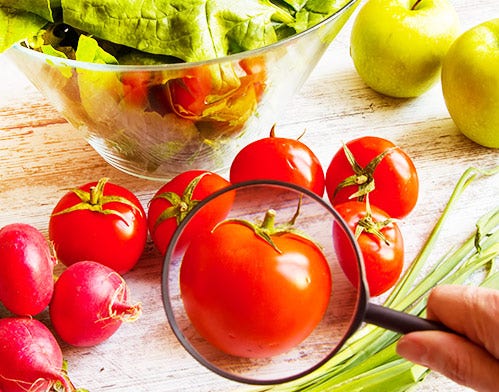What’s the Real Deal with Food Expiration Dates?
- 5/2/17

Many of us have long adhered to the old saying “if in doubt, throw it out” with regards to food safety. However, most foods commonly tossed are still safe to eat. Food waste is a serious problem, and confusing expiration dates are largely to blame. According to a collaborative study by the Natural Resources Defense Council (NRDC) and Harvard Law, over 90 percent of Americans throw food away because they misinterpret food label dates such as “sell by” as a mistaken indicator of food safety.
In most cases, manufacturers provide dates not for safety purposes, but instead, as guidelines to help consumers and retailers decide when food is of the best quality and freshness, according to the USDA. Further, federal law only actually requires dates on infant formula and baby foods, although some states do require that dairy products are pulled from shelves on the expiration date. Best before, sell by, use by, best if used by – what is the difference?
Here is a quick guide from WebMD and the USDA for deciphering labels the next time you’re out grocery shopping or perusing through the contents of the refrigerator or pantry:
As a general precaution, more processed foods keep longer, according to several health experts, as reported by Fox News. For instance, frozen foods are usually safe to eat (except for meats) past their expiration date. Freezer burn or ice crystals will usually deter taste quality, but safety is typically not an issue. Dry goods like pasta don’t easily spoil since they don’t contain any water content. Therefore, unless it smells odd or shows signs of bugs, pasta can be kept past the expiration date. Bread can be last past its date if sealed up and stored in the fridge or freezer. As long as no mold is present, it is safe to eat. While not highly processed, eggs are another common household staple. There is a quick test to check if eggs are still safe to eat. Simply put an egg in a bowl of water, and if it floats, the bacteria count is too high and it is no longer suitable to consume.
Food-based supplements and vitamins are often also safe to consume past their “best by” date. For the most part, manufacturers provide these dates to indicate the last date for a product’s ingredients to still have the highest level of potency, as reported by the New York Times. If stored properly away from heat, light and humidity, vitamins and supplements can last up to two years past their “best by” date. However, for probiotics, liquids and oils, the window is about a year after the date.
The two largest food industry groups, the Grocery Manufacturers Association and the Food Marketing Institute, have begun trying to narrow down the plethora of food date guidelines to help eliminate some of the existing confusion. By the summer of 2018, most foods will carry a “best if used by” date to indicate freshness, or “use by” date if safety or spoilage is a concern, according to a report from NPR. By clarifying for consumers what food is safe to still eat, the millions of tons of food currently wasted annually can be greatly reduced.
In most cases, manufacturers provide dates not for safety purposes, but instead, as guidelines to help consumers and retailers decide when food is of the best quality and freshness, according to the USDA. Further, federal law only actually requires dates on infant formula and baby foods, although some states do require that dairy products are pulled from shelves on the expiration date. Best before, sell by, use by, best if used by – what is the difference?
Here is a quick guide from WebMD and the USDA for deciphering labels the next time you’re out grocery shopping or perusing through the contents of the refrigerator or pantry:
- “Expires On/By” date: this is a safety guideline which refers to the very last date a food should be eaten or used.
- “Best if Used By/Before” date: this indicates when a product will be of its best flavor or freshness quality. It is not a safety date.
- “Sell-By” date: this is basically a guide for the retailer, as this date tells the store how long to display the product for sale. Again, this date too refers to the quality of the item in terms of freshness, taste and consistency—it’s not a safety date. Foods will still be edible for some time after.
- "Use-By" date: this is the last date recommended for the use of the product while at peak quality, as determined by the manufacturer. It is not a safety date except on infant formula or baby foods, as mandated by law. However, err on the side of caution with highly perishable foods with a “use-by” date, such as deli and fresh meats, soft cheeses, leafy greens and raw cold-pressed juices. Health experts warn that these fresh foods have a higher chance of developing bacteria and risk of foodborne illness compared to “use by” date on foods processed for longer shelf life (such as frozen foods and canned goods). These foods are most likely fine a bit past the date, provided they were stored properly.
As a general precaution, more processed foods keep longer, according to several health experts, as reported by Fox News. For instance, frozen foods are usually safe to eat (except for meats) past their expiration date. Freezer burn or ice crystals will usually deter taste quality, but safety is typically not an issue. Dry goods like pasta don’t easily spoil since they don’t contain any water content. Therefore, unless it smells odd or shows signs of bugs, pasta can be kept past the expiration date. Bread can be last past its date if sealed up and stored in the fridge or freezer. As long as no mold is present, it is safe to eat. While not highly processed, eggs are another common household staple. There is a quick test to check if eggs are still safe to eat. Simply put an egg in a bowl of water, and if it floats, the bacteria count is too high and it is no longer suitable to consume.
Food-based supplements and vitamins are often also safe to consume past their “best by” date. For the most part, manufacturers provide these dates to indicate the last date for a product’s ingredients to still have the highest level of potency, as reported by the New York Times. If stored properly away from heat, light and humidity, vitamins and supplements can last up to two years past their “best by” date. However, for probiotics, liquids and oils, the window is about a year after the date.
The two largest food industry groups, the Grocery Manufacturers Association and the Food Marketing Institute, have begun trying to narrow down the plethora of food date guidelines to help eliminate some of the existing confusion. By the summer of 2018, most foods will carry a “best if used by” date to indicate freshness, or “use by” date if safety or spoilage is a concern, according to a report from NPR. By clarifying for consumers what food is safe to still eat, the millions of tons of food currently wasted annually can be greatly reduced.





